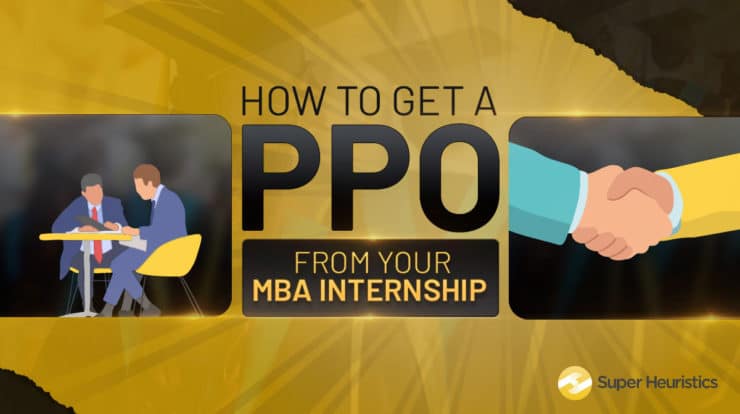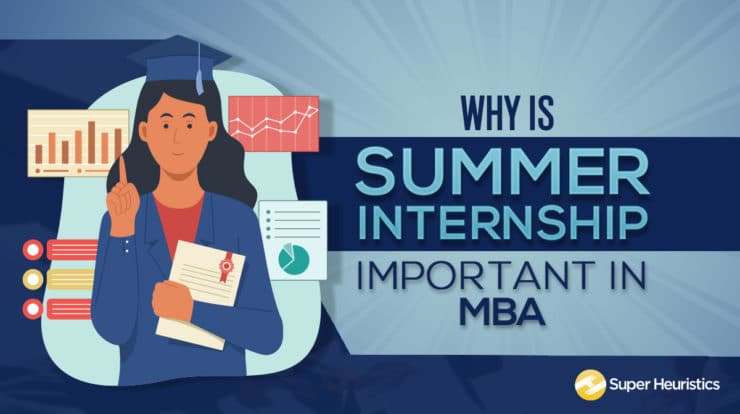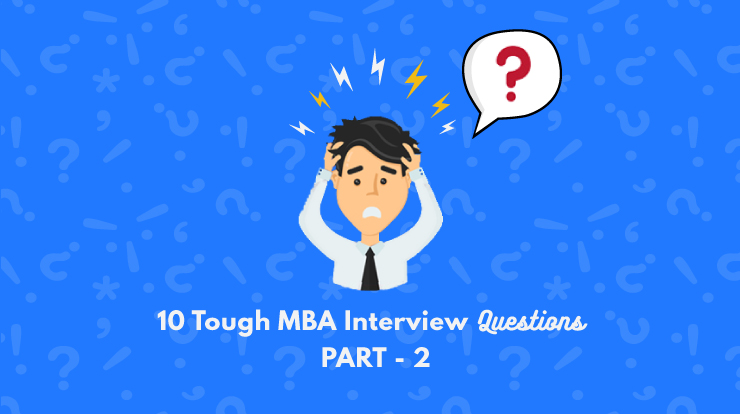
If you are someone who is just starting their summer internship at a company and are trying to figure out how to get a PPO after an internship, then let me give you a precap of what could happen.
It is likely going to be an unsettling time for you, irrespective of whether you are a fresher or someone who had worked prior to an MBA.
The reason for that is pretty straightforward.
It is the first time in the last few months since you joined your B-school that the brand of your B-school will cease to matter. The brand of your B-school will have limited to no impact on your chances of getting PPO after the internship.
Why is that?
Take, for instance, Boston Consulting Group (BCG), one of the most coveted placements in the consulting domain.
If you check the LinkedIn profile of any MBA graduate who interned with them last year, you are likely to find on their LinkedIn feed a group photograph of them with all the other interns at BCG for that year.
Guess what, all of those 30-50 interns that you will see in the photograph will be from the Tier 1 B-schools of India, i.e. IIM Ahmedabad, IIM Bangalore, IIM Calcutta, IIM Lucknow, IIM Kozhikode, XLRI, SP Jain, FMS Delhi, and the likes.
The bottom line is, that everyone who has made it there has made it. And they cashed in on their B-school brand right on that day when they entered their interview room during the summer internship placements.
Now, their and your PPO conversion, that is whether you will get the pre-placement offer from the company or not, boils down to who you are, what you do, and what qualities can you project onto your superiors during the course of the 8-weeks of your summer internship.
In this discussion, allow me to help you get a perspective on how to get a PPO after an internship during MBA.
How to get a PPO from the internship?
Everything you can know about doing your best to improve your chances of getting a PPO after an internship, I have listed down in 7 exact points.
When I am writing each of these 7 points on how to get a PPO after the internship, let me tell you, I am writing them down wearing two different hats.
One is that of an MBA student who had experienced a summer internship and had secured a PPI from my company.
The other hat, and a more important one, is that of a recruiter and manager for my previous employer where I had spent a significant time with the founders and leadership to manage the interns.
Let me take you through my 7 points which, if understood and implemented well, are going to maximize your chances of getting a PPO after an internship.
1. Get clarity on the project deliverables
Never should you underestimate the power of a good start. Also, a good start to your internship is not about making a good rapport with all your fellow interns or with your manager.
The kind of a good start that I am suggesting to you here is to be a ‘man on a mission and to start getting clarity about your project and what is the outcome that is expected by you.
I have seen bad things happen at companies where the internship programs are not carefully designed and the HR team isn’t actively involved.
In such situations, most interns have no clarity about their project even up until the 4th week of the internship. And even if they do, their managers are seldom available to guide them through the project.
Therefore, avoid getting into that limbo where the first few weeks of the internship just pass by without you having a clue of what happened.
My suggestion here is to schedule a series of meetings with your manager, two meetings to start with at least 4-to 6 days in between the two meetings.
The first one is to hear the manager’s mind on what is the project all about and what are your deliverables going to be.
You would be requesting the second meeting so that you can go back to the drawing board, do your initial research and suggest a course of action for your project for the next 7-8 weeks.
This follow-up meeting is crucial also because it helps you clarify any doubts which may have come up in your mind after the first meeting.
Now, obviously, here are three more things you need to note about this suggestion of mine.
1. Here, my assumption is that the structure of your internship program won’t have weekly meetings with your manager. Hence, you need to take this initiative.
2. Obviously, different job roles might require a different kind of tweak to this suggestion.
For example, if your internship is entirely sales, ‘feet-on-street’, where you are virtually never in the office – do these meetings over a phone call with whoever has assigned you the project and is also your project manager
3. There could be situations where your office manager and the person who gives you the work are two different people.
During my stint at the workplace, I have also guided interns who were reporting to the founders/CxOs of the company but I was their work guide.
In such a case, conduct a meeting with both the people – preferably with your work guide first so that you can discuss the work assigned to you with your reporting manager.
2. Discover the hard skills and soft skills required
Would you imagine that I have seen students (some of my own friends) from the old IIMs struggle to wrap their heads around MS Excel when their entire internship was basically only around that?
But that’s the truth.
And that has always been a reminder for me and should also be for you that hard skills can never be taken for granted.
We tend to spend our entire first year of MBA on vanity pursuits such as networking and making the best of our friends. While doing so, we tend to give negligible time to our own foundations.
My humble suggestion to you is that focus on your skills first. And this is a combination of hard skills and soft skills.
No matter what time of the year you may be reading now is the down to get started.
Therefore, here the suggestion is that after you have understood what the job role is all about after your meetings, decompose your entire job role in terms of the hard skills and the soft skills that the job requires.
One way to do it is to go through all the similar job descriptions on iimjobs.com and make a list of all the skills that different companies ask for this kind of job.
Frankly, being able to decompose a job role into its constituent skills in itself is a skill. Had students/professionals understood it, they would have been able to do focused preparation.
I have made a video on this process of finding hard skills and soft skills. You must see this video completely for you to get the clarity.
In my community, Five Steps Ahead, where I help MBA students get the best career outcomes without depending on the placements, this is one of the most important things that I talk about in my course Skill Clarity Blueprint.
Now, the point is that once you know these skills – you need to quickly start acquiring these skills. I wish and hope that you are reading this article much before your summer internship actually begins.
But even if you are in it, see how quickly can you learn these over a weekend or two.
3. Have lunch with 3 kinds of people in your company
Now, from the looks of it, there is nothing too fancy about this advice. And it is actually as simple and straightforward as it seems to be here.
You need to start sitting at the big men’s table at your office. But only during the lunch hour to start with. You would be tempted to eat lunch with your fellow interns, and that’s absolutely fine.
However, do not forget that you are a man on a mission and you need to significantly improve your chances of getting a PPO from your internship.
Therefore, you need to find a way to have lunch with the following three kinds of people at your workplace and maybe even get your fellow interns with you, if required.
1. The decision-makers (for the bird’s eye view) – These are the big people in the company.
Your internship manager could be one among this group, maybe. If not, then you need to find who is your department heads and build a rapport with them.
You could request them for a meeting. Usually, the schedules of such people are extremely tight and, in fact, the lunch hour might actually be the only time you would be able to get 10 minutes with them.
2. The people’s people (for a balanced view) – These are the mid-level managers who manage the people in your company.
Post your MBA, you are likely to work extremely closely with them and eventually become one of them in about a year or two.
Hence, you are likely to get a really good understanding of the company culture and of the work that is required. Further, you will be able to clarify your intent of sticking around at the company in a more direct way.
I personally feel that mid-level managers can become great workplace friends. They are likely to also pass on good feedback to your reporting manager or your reporting manager/herself could be one of these people.
3. The crucial executioners (for an ant’s eye view) – These are the people who take directions and execute the task. To build a good rapport with them because they can tell you a lot about the company operations and how the work actually gets done.
Most likely, you will have a lot of work to be done with/through these people. This means even for your internship to shape up well, you need this group of people to cooperate with you and keep supplying you with the data or support that is required.
That reminds me that the technology team in any small to medium organization are these people. These are the guys who are building the product and are doing the ‘last-mile’ for the online product that your company would be creating.
4. Invest – Time, Thought, and Money
At this point, you would have realized that for you to execute all the above, it will require a significant amount of time investment.
This fourth point is to re-iterate that and is also to tell you about how you should feel absolutely okay in going the extra mile.
Investing in thought is underrated. To explain to you what I mean by that I would say imagine that when you are not at work, you still think about doing your best at it and what new can you do in it.
Now, my suggestion is not to make you a person obsessed with your internship and work, but then if you are not regrouping your thoughts when you are by yourself then you are likely to feel lost in your internship.
The fact is things can move really fast in your internship program. And the competition is also real.
This means that you need to invest thought in thinking about what all-new, innovative, and impactful can you do for your project.
Investing money is something that would be slightly new for you to hear. What do I mean by that? Let me explain this with two examples.
First. We had an intern from one of the newer IIMs at the company that I used to work for. He was assigned a project which was regarding optimizing our Facebook Ads and suggesting a different strategy.
Obviously, this intern was hired because he seemed to have some prior knowledge and experience of digital marketing. What he did during his first week of the project itself really clarified his intent really well.
He spent some of his own money and ran some Facebook Ads on his Facebook page itself just to demo us the impact of the strategy that he is suggesting.
Now suddenly, not only his presentation was extremely impactful because it had real data which came in after spending his own money.
At the same time, this also showed he valued being at this company.
Second. Investing money to get a PPO from your internship could simply mean spending money on certain courses that can upskill you with the right kind of skills.
I remember taking up a course and finishing it over a weekend because there was a certain aspect about Big Data engineering (Hadoop) that I had to learn for my project and to make my presentation more impactful.
So, I did make that investment that made my presentation significantly better.
Overall, you will only thank yourself that you invested some serious time, thought and money into your internship and the results are likely to be as desired.
5. Seek feedback
When I say seek feedback it could get assumed to be understood as seeking feedback about your performance.
Now, while that surely is important, there are other things to seek feedback about as well which could be far more important for your manager.
People will appreciate if you seek feedback on the project and your progress and actions on it till now.
When I mentioned that you should ideally be having lunch with three different kinds of peoples this could be the interaction that you can have with them.
The three kinds of people that I mentioned to have lunch with, they have different motivations and it is likely that they would be willing to give you feedback on the progress of your work.
Another important thing is that, some of those people might very well be involved in the execution of your project. Which means while seeking feedback, you are also somewhere seeking their buy in on your plans.
Hence, with their plans, the project becomes one of their own and could become a collective effort.
The idea is to build a rapport with people over the work related matters and also be able to directionally calibrate your project in the correct direction.
6. Perfect your presentation
You internship is likely to end with a presentation that you will need to make to your manager and others in the senior management of the company.
This presentation should properly reflect all that you have done over the last 7-8 weeks that’s because despite how many good relations you may have built during the internship – this presentation is the final impression that you are going to leave them with.
And your evaluation majorly depends on this presentation.
Therefore, the suggestions to perfect your presentation to improve your chances of getting a PPO are simple and are as follows:
a) Make sure that your presentation has the correct title. This should be the exact project title that was given to you.
This would show that you are focused on the goal that was given to you and most students forget this part conveniently.
b) The overall template should either be the company’s template for PPTs or if they don’t provide that to you for some reason then it should be close to what their brand template is.
c) Now, while I would say that you should not clutter your presentation slides, which is a basic hygiene factor, try and mimic the kind of PPTs within the company.
I am sure during the course of the internship you may get exposed to some previous company documents and PPTs and you can take a good idea from there.
d) All of what I mentioned above is about the design aesthetics. But content is the most important thing. Please structure your content across slides in a simple manner – a good tip here is to see it as a story that you need to tell.
e) If you are not sure how to present your case, check out my course on Case Analysis Mastery in which I share with you how to crisply analyze any marketing case in just 5 slides.
f) Your PPT should include a plan of action surely and maybe even projections of how early can the company get the outcomes from the projects once it’s rolled out.
7. Over-deliver
This is going to be my best advice to you in this entire article and for the sake of its impact, I will keep it really short.
If you were to forget everything else that I told you in this article but if you were to remember one thing from it, then just remember this – over-deliver.
In fact, if you look back and read all the points before this, you will realize that all the points are about stretching yourself beyond the normal and over-delivering.
It could simply mean producing a supporting Excel file along with your presentation. And it could mean taking the pains of conducting on-ground customer research even if your manager didn’t ask for it.
The idea is to over-deliver and then show in the final presentation how well did you do these things.
Therefore, each day of your internship just keeps reminding yourself to over-deliver.
Frequently Asked Questions about PPO/PPI
Let me take up some frequently asked questions about how to get a PPO after an internship. These are usually the questions that I receive from students and what I have seen people asking around over the internet.
Q. What is a Pre-placement Offer (PPO)?
A pre-placement offer (PPO) is when a company sends you the final job offer basis your performance during the internship period.
So basically, the company first hires you for a short-term internship period which happens at the end of your first year of MBA (usually in April and May).
Then if your performance is good, you will have a final offer from them to join their company at the end of your MBA program.
Most companies prefer to hire Management Trainees only through this route and it is also a great way for you to show your skills and truly make an impact.
Q. What is a Pre-placement Interview (PPI)?
A pre-placement interview is an offer similar to a pre-placement offer. The only difference is that in a PPO you have a confirmed job offer at the company, in the PPI, you will be first interviewed again towards the end of the second year.
And if at that stage you come across as the right candidate for that job role, the organization would welcome you with open arms.
You can see the PPI as an assured entry to the interview room. Surely you will have an edge since you have worked at the company and have experienced its culture and processes firsthand.
Q. Do all interns get a PPO?
It entirely depends on the company and its requirements at the time.
Most small to medium-sized companies take in a few interns during summers (say, 4-5) and aim to give all of them the final job offer.
Most large companies take as many as 50 interns across the colleges and aim to be selective to pick the best.
A general answer to that question would be no, not all the interns get a PPO, but yes, all interns can get and also no intern may get a PPO entirely depending on which company are you interning at and what has been their history.
Q. Do I really need the PPO?
I wish more students asked this question. The answer is no. Not everyone needs a PPO for the simple reason that most likely the company you are interning at isn’t even the company that you want to work for in the future.
But maybe you still want that PPO an are dying for it so that it becomes a good claim to fame for you.
However, my advice is that if you have decided early on that this is neither the company nor the job role that I am looking to work in – please do not get into the mad rush of working hard to get the PPO.
Instead, spend your time upskilling for the skills that will truly make an impact on you.






